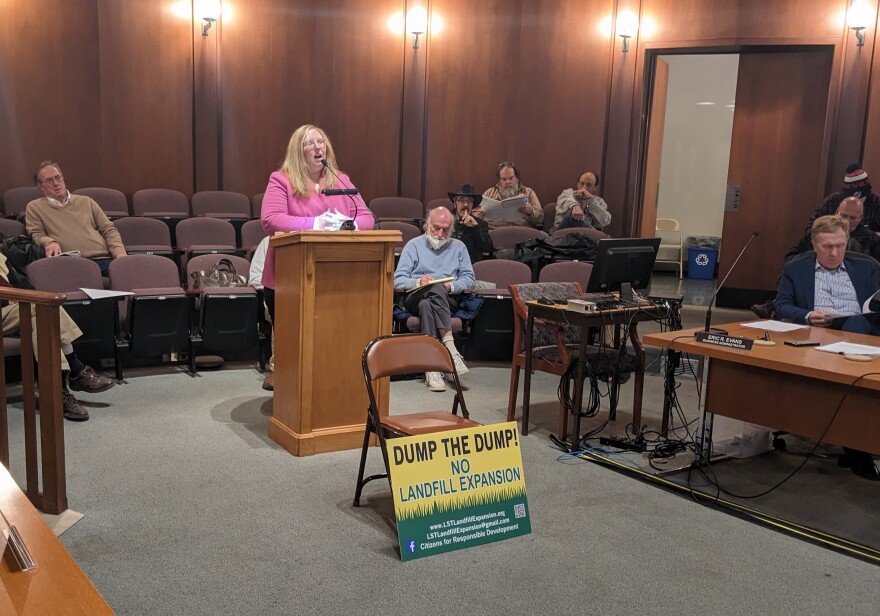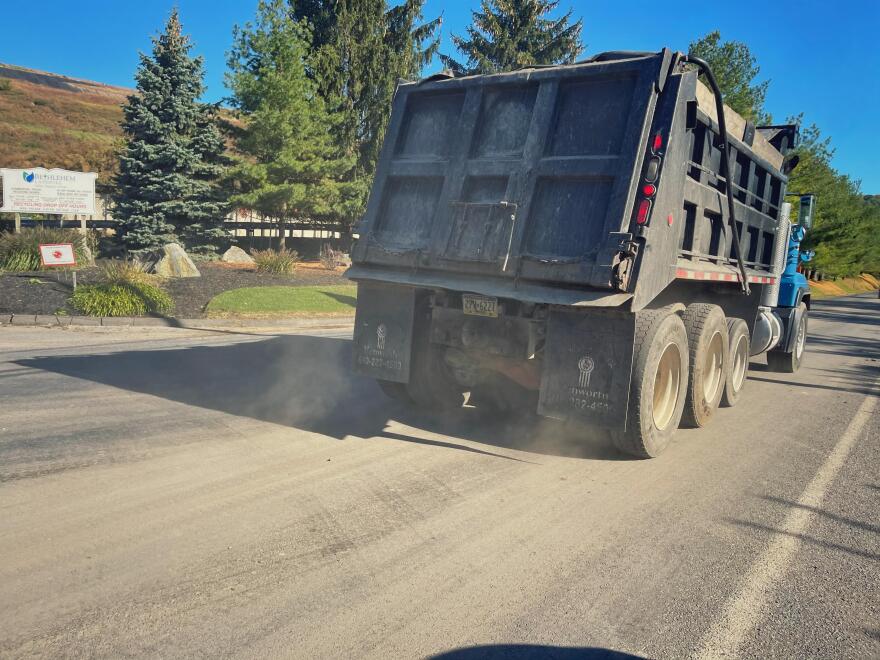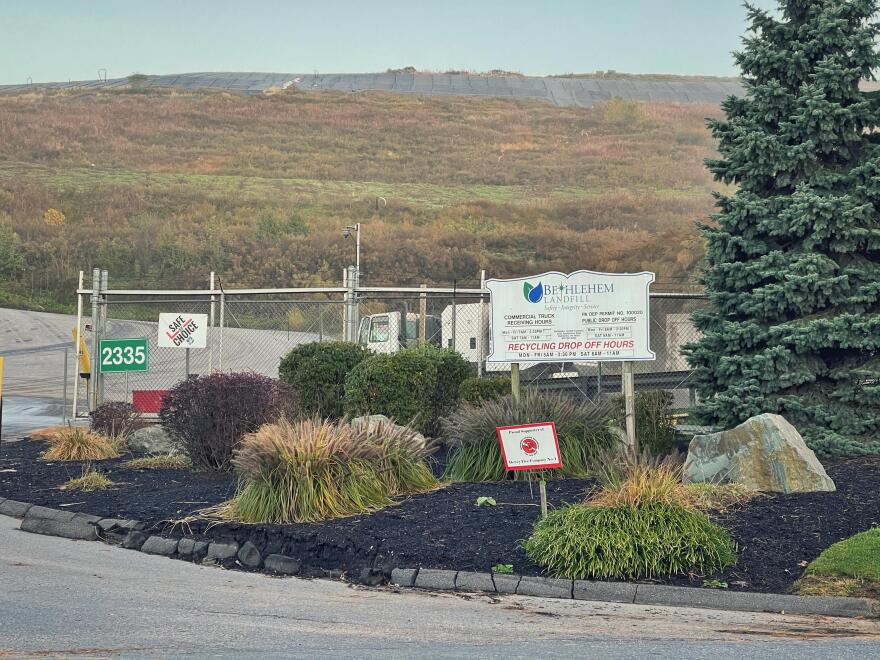BETHLEHEM, Pa. — As leachate flows from Bethlehem Landfill into the city’s wastewater treatment plant, local water sources are affected, according to experts.
The Lehigh River suffers as a result, some say.
Area professors, students and residents came forward at this week's Bethlehem City Council meeting to share their concerns, demanding substantive action from city officials.
- Locals addressed Bethlehem City Council on Tuesday, citing concerns over leachate flow from Bethlehem Landfill to the city wastewater treatment plant
- The city and landfill hold an industrial waste discharge permit agreement that's set to expire June 30, but could be renewed
- Residents said the city's decision will have lasting effects on the area and those down the Lehigh River

'Forever chemicals
Victoria Opthof-Cordaro, representative for Citizens of Responsible Development-Lower Saucon Township, said the Environmental Protection Agency has released information on water testing as it relates to “forever chemicals,” otherwise known as “PFAS,” short for perfluoroalkyl and polyfluoroalkyl substances.
She encouraged council to review the industrial waste discharge permit between the city and Bethlehem Landfill that’s set to expire June 30 and could see renewal.
“We don’t know what comes out of the landfill unless we test for it,” Opthof-Cordaro said. “So I am respectfully requesting that Bethlehem City continue to watch this very carefully.”
After providing a PFAS update, she then shared more on the recent legal motion regarding the potential expansion of Bethlehem Landfill.
“Let’s do more for our generation,” she said. “Let’s do more for our future, and let’s be proud of what we can do today.”
“If we can send a man to the moon, I think we can manage our garbage in a little bit better way. So we really need to fight for our land, for our Valley, for our people.”Russell Sutton, Steel City resident
Steel City resident Russell Sutton said he’s been fighting the landfill for a couple of decades. He’s watched as the landfill company has “bought that whole side of the mountain.”
Sutton said that in his 35 years of working as a critical care nurse with Lehigh Valley Health Network, he’s treated many people for water poisoning. And the level of PFAS in the landfill’s leachate is concerning, he added.
“If we can send a man to the moon, I think we can manage our garbage in a little bit better way,” Sutton said. “So we really need to fight for our land, for our valley, for our people.”

'A vote for the status quo'
Bilal Khan, professor of public health at Lehigh University and resident of Lower Saucon Township, said elected officials need to be proactive in considering the effects of this agreement with the landfill.
“It might not be the case that the side effects of this decision to renew will manifest within a period of your terms,” Khan said. “But the city of Bethlehem will be straddled by downstream litigation from the consequences of the decision that you make.
“I also think that a vote to renew is a vote for the status quo.”
"It sucks to see that in a room full of Democrats and people who I admire to be extremely competent people, that we couldn’t put our heads together and do even something. Instead, all we did was waive away our rights.”Brian Lucas, Lehigh University student speaking on the potential expansion of the landfill
Bethlehem hasn’t joined the landfill conditional use hearings so far, unlike other municipalities and groups that have obtained party status in the fight: Northampton County, Bethlehem Township, Easton, Hellertown, Freemansburg and St. Luke’s University Health Network.
That was a concern of Brian Lucas, a Lehigh University student studying public health and environmental health sciences.
“I think, for other cities getting involved in this means that we can, too,” Lucas said. “I hope the time and the day comes that we will do it.”
“ … It sucks to see that in a room full of Democrats and people who I admire to be extremely competent people, that we couldn’t put our heads together and do even something. Instead, all we did was waive away our rights.”

'Vague goals' to 'concrete actions'
Breena Holland, Lehigh University professor of environmental politics and policy, said that there’s plenty of peer-reviewed research available showing the dangerous effects of PFAS, including links to decreased fertility, abnormal hormone function, developmental delays in children and increased risk of cancers.
“It’s really important, I think, that we actually start moving from vague goals in educating the public and encouraging better environmental behavior to some concrete actions that are actually going to improve environmental protection and environmental equity.”Breena Holland, Lehigh University professor of environmental politics and policy
Holland advocated for particular conditions to be included with the potential renewal of the discharge permit, including required testing for the dangerous materials discussed as well as proactive accommodations from the landfill.
“It’s really important, I think, that we actually start moving from vague goals in educating the public and encouraging better environmental behavior to some concrete actions that are actually going to improve environmental protection and environmental equity,” Holland stated.
'We are not sympathetic to trash'
Edward Boscola, director of the city’s water and sewer resources department, was quoted as part of a February letter of concern sent to the mayor and council by the chair of the city’s environmental advisory council, Lynn Rothman.
“In regard to the expansion of the landfill, the City’s position is that this is an issue between the landfill and Lower Saucon Township,” Boscola said. “Any discussion on matters that affect their discharge permit as a result of expansion, such as changes in flow or waste strength, will be dealt with separately by the City and landfill through the permit process.
“This ensures independent oversight on these matters since we are responsible to EPA for enforcement.”
Mayor J. William Reynolds said city solicitors and Boscola have been working for some time at analyzing the language of the discharge permit.
“Obviously, we are not sympathetic to trash,” the mayor said. “I’ve been part of a couple of conversations, but they’re obviously investigating that and trying to put as stringent as they can legally into that document.”


